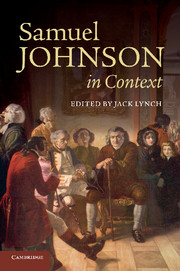Book contents
- Frontmatter
- Contents
- Illustrations
- Contributors
- Preface
- Chronology
- Abbreviations
- Part I Life and works
- Part II Critical fortunes
- Part III Contexts
- Chapter 10 America
- Chapter 11 Anglicanism
- Chapter 12 Anthropology
- Chapter 13 Authorship
- Chapter 14 Biography
- Chapter 15 Book trade
- Chapter 16 Clubs
- Chapter 17 Conversation
- Chapter 18 Dictionaries
- Chapter 19 Domestic life
- Chapter 20 Education
- Chapter 21 Empire
- Chapter 22 Essays
- Chapter 23 Fiction
- Chapter 24 History
- Chapter 25 Journalism
- Chapter 26 Law
- Chapter 27 Literary criticism
- Chapter 28 London
- Chapter 29 Medicine
- Chapter 30 Mental health
- Chapter 31 Money
- Chapter 32 Nationalism
- Chapter 33 Philosophy
- Chapter 34 Poetry
- Chapter 35 Politics
- Chapter 36 Scholarship
- Chapter 37 Science and technology
- Chapter 38 Scotland
- Chapter 39 Sermons
- Chapter 40 Shakespeare
- Chapter 41 Slavery and abolition
- Chapter 42 Social hierarchy
- Chapter 43 Theatre
- Chapter 44 Travel
- Chapter 45 Visual arts
- Chapter 46 War
- Chapter 47 Women writers
- Further reading
- Index
- References
Chapter 38 - Scotland
from Part III - Contexts
Published online by Cambridge University Press: 05 June 2012
- Frontmatter
- Contents
- Illustrations
- Contributors
- Preface
- Chronology
- Abbreviations
- Part I Life and works
- Part II Critical fortunes
- Part III Contexts
- Chapter 10 America
- Chapter 11 Anglicanism
- Chapter 12 Anthropology
- Chapter 13 Authorship
- Chapter 14 Biography
- Chapter 15 Book trade
- Chapter 16 Clubs
- Chapter 17 Conversation
- Chapter 18 Dictionaries
- Chapter 19 Domestic life
- Chapter 20 Education
- Chapter 21 Empire
- Chapter 22 Essays
- Chapter 23 Fiction
- Chapter 24 History
- Chapter 25 Journalism
- Chapter 26 Law
- Chapter 27 Literary criticism
- Chapter 28 London
- Chapter 29 Medicine
- Chapter 30 Mental health
- Chapter 31 Money
- Chapter 32 Nationalism
- Chapter 33 Philosophy
- Chapter 34 Poetry
- Chapter 35 Politics
- Chapter 36 Scholarship
- Chapter 37 Science and technology
- Chapter 38 Scotland
- Chapter 39 Sermons
- Chapter 40 Shakespeare
- Chapter 41 Slavery and abolition
- Chapter 42 Social hierarchy
- Chapter 43 Theatre
- Chapter 44 Travel
- Chapter 45 Visual arts
- Chapter 46 War
- Chapter 47 Women writers
- Further reading
- Index
- References
Summary
OATS. n.s. [aten, Saxon.] A grain, which in England is generally given to horses, but in Scotland supports the people.
The oats have eaten the horses. Shakespeare.
Samuel Johnson’s view of Scotland and the Scots has usually been seen in negative terms: the focus has been on what Boswell calls his “prejudice against both the country and people of Scotland” (Boswell, Life, 2:300). Boswell sought to hide his own Scottish identity when he was first introduced to Johnson in 1763, in deference to the Englishman’s perceived Scotophobia:
recollecting his prejudice against the Scotch, of which I had heard much, I said to Davies, “Don’t tell where I come from.” – “From Scotland,” cried Davies, roguishly. “Mr. Johnson, (said I) I do indeed come from Scotland, but I cannot help it.” … I meant this as light pleasantry to sooth and conciliate him, and not as an humiliating abasement at the expence of my country. But … he seized the expression “come from Scotland,” which I used in the sense of being of that country; and, as if I had said that I had come away from it, or left it, retorted, “That, Sir, I find, is what a very great many of your countrymen cannot help.” (Boswell, Life, 1:392)
The taunts aimed at Scotland continued throughout their twenty-year acquaintance. In 1769, Johnson told Boswell, “Sir, you have desart enough in Scotland” (2:75); in 1775, he expressed himself on “the extreme jealousy of the Scotch” (2:306), and his infamous gibing definitions of terms like oats in the Dictionary are well known. His declaration that “The impudence of an Irishman is the impudence of a fly … The impudence of a Scotsman is the impudence of a leech, that fixes and sucks your blood” (Miscellanies, 1:427) seems to be confirmation of Johnson’s insularity and prejudice bordering on racism.
Affectionate caricature?
At the same time, there are problems with this traditional account. First, there is the question of how far Boswell’s Johnson was more an “affectionate caricature” than a piece of biographical fidelity. Traditional accounts that minimize Boswell’s “organizational and interpretive power” have become increasingly marginalized over the last forty years, and this has been reflected in controversies over both Boswell’s artistry and his accuracy in reporting Johnson’s sentiments, particularly in the field of Johnson’s alleged Jacobitism, his loyalty to the exiled Stuart dynasty (see chapter 35, “Politics”). Second, there is the question of how far Johnson’s anti-Scottishness was directed at a particular kind of Scotland – the Presbyterian, pro-Hanoverian, and Unionist Scotland of the eighteenth-century Scotsman on the make. Johnson, as historian J. C. D. Clark notes, thought “that the decline of learning went together with the advance of Presbyterianism,” and Johnson “pointedly refused to enter a Presbyterian church in Scotland.”
- Type
- Chapter
- Information
- Samuel Johnson in Context , pp. 329 - 336Publisher: Cambridge University PressPrint publication year: 2011



